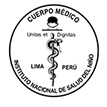Resilience and burnout syndrome in nursing staff of the National Institute of Child Health, Lima, 2019
DOI:
https://doi.org/10.58597/rpe.v1i1.8Keywords:
Psychological resilience, Burnout, profesional, Conduct, Psychology, Critical careAbstract
Background: nurses who work in the emergency service and critical care are exposed to stressful environments, being vulnerable to professional burnout syndrome. Objective: to determine the relationship between resilience and professional burnout syndrome in nurses from the critical services area of the national institute of child health, lima, 2019. Methodology: observational and cross-sectional study carried out on nurses who work in the area of critical services. the maslach burnout inventory and wagnild and young resilience scale instruments were used. for the statistical analysis, the structural equations procedure - sem was used, by means of the maximum likelihood adjustment, in order to obtain the factorial loads between the variables. Results: 181 nurses participated, 96.1% were women and 59.1% were between 41 and 60 years of age. 11.6% presented a low level of resilience and 44.2% a high level of professional burnout syndrome. in the multivariable analysis regarding the scores of resilience and burnout syndrome, the regression coefficient was: β=-0.19; p=0.039, which explains the resilience in 3.6% of variance to professional burnout syndrome. Conclusion: nearly half of the nursing staff presented a high level of professional burnout syndrome. likewise, we found that the relationship between resilience and burnout syndrome was negative and statistically significant, so that the lower the level of resilience, the higher the level of burnout syndrome in nursing staff.
Downloads
Downloads
Published
Issue
Section
License
Copyright (c) 2022 Felix J. Bancayán-Martínez, Delmer Romero-Palomino

This work is licensed under a Creative Commons Attribution 4.0 International License.

















